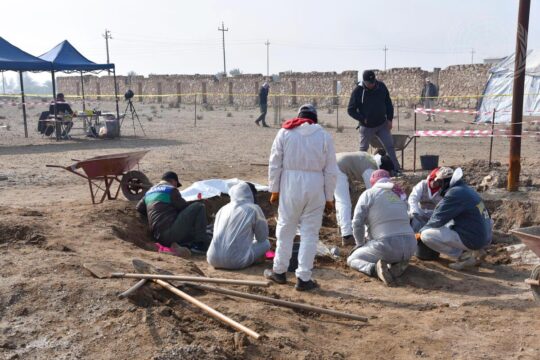French jets blasted off from an aircraft carrier Friday to go into action over Iraq as the international coalition builds up for the looming battle to win back Mosul from Islamic State jihadists.
Eight jets took off from the Charles de Gaulle carrier in the eastern Mediterranean in the first operations since it left port in France on September 20, an AFP journalist on board reported.
French military officials refused to say whether the Rafale jets were carrying out air strikes or were on a reconnaissance mission.
But the return of the Charles de Gaulle to the region on its third mission since February 2015 is another sign of the steady build-up of forces for an offensive on Mosul, Iraq's second-largest city.
French Defence Minister Jean-Yves Le Drian said the carrier was "contributing to the coalition's strikeforce", but that the offensive for Mosul had not yet begun.
"It is not the start of the battle for Mosul. This is the continuation of support operations that we are providing for the coalition," he said on a visit to western France.
"A major operation is about to be unleashed, but not today," he added.
US Defence Secretary Ashton Carter said Wednesday he was sending about 600 extra troops to Iraq to train local forces for an assault. They will join 4,600 military personnel already in Iraq.
IS seized Mosul along with other areas of Iraq in June 2014, but Iraqi forces have since regained significant ground from the jihadists and are preparing for an assault to retake Mosul with coalition air and artillery support.
- Forces gathering -
More than 200 people have been killed in attacks in France undertaken by IS in the past 12 months and President Francois Hollande has said his nation is at "war" with the group.
The 24 planes on board the Charles de Gaulle triple France's bombing capacity in the region. Twelve French air force Rafale jets are already stationed in Jordan and the United Arab Emirates.
France has carried out more than 15,000 air strikes against IS targets in Iraq and Syria since 2014, representing five percent of the total undertaken by the US-led coalition.
US planes have accounted for 80 percent of the strikes.
The offensive on Mosul could begin in October with the aim of taking full control of the city by the end of the year, Western officials have said.
The Pentagon estimates that between 3,000 and 4,500 IS fighters remain in Mosul.
Around 500 French soldiers are based in Iraq, advising Kurdish peshmerga forces in northern Iraq and helping to train elite Iraqi army units.
The extra US forces announced this week will head to Qayyarah, a strategically key air base 40 miles (65 kilometres) south of Mosul that will help channel supplies and troops towards the city.
They will also help increase the capabilities at the joint Iraqi-US Al Asad air base for night operations and operations in low visibility.
Russian forces have concentrated their efforts on propping up Syrian President Bashar al-Assad and on Friday marked a year since beginning air strikes.
The United Nations has expressed concern that the offensive on Mosul could trigger one of the worst humanitarian crises in recent years, forecasting that at least 700,000 people could require assistance.
"Mosul has the potential to be one of the largest... disasters of many, many years," Bruno Geddo, the UN refugee agency's main representative in Iraq, said Thursday.



